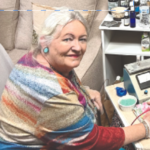The Importance of Food Compatibility
Posted by: locallygrown | Posted on: June 1, 2023
by Kay Lucas
Solutions in Health Care focuses on a natural way of healing by discovering the truth about what is happening in your body.
Owner, Dr. Jeanne Petan, earned her Ph.D. in Biological Science from the American College of Nutripathy in Arizona. She offers many services at her home-based office; one of the most fascinating is determining which foods an individual is compatible with, whether from genetics or biological disorder.
Petan still regards what she was instructed many years ago, “Practitioners have two things to do: first, identify the cause of their patient’s disorder and set up a detoxification program. And second, set up a food compatibility program that will feed their body and not their infections.”
She explains, “People want to heal themselves, but they don’t have the opportunity in the matrix of the United States AMA philosophy, where it’s about drugs and surgery. If you change your diet, you may get a little better, but you won’t resolve your disorder because you have not gone to the core. If you can find someone who can identify the cause of your disorder, and they give you interventions such as herbs and homeopathics, but they don’t address your individualized dietary needs, you will not heal. It’s the difference between getting a little better or resolving the condition. That is, finding cause AND diet compatibility. But, after detoxifying, you will need another food screen to determine what your optimal diet is.”
A great example is gluten. Are people really gluten intolerant? “Well, if they have celiac disease, which is genetic, then yes, they are. Then they will have a severe reaction to gluten – which is a protein, not a sugar. However, it’s the contamination of the food that we have an allergic response to. An example is genetically modified foods, and that is a big problem in this country,” according to Petan.
In other countries, sitting down to eat is an experience that can last hours. They make food from scratch and serve freshly grown produce. More often than not, the opposite is true in the United States. We choose convenience, processed, and on-the-go meals. Also, the preservatives added to make foods last longer can be quite harmful.
The food you are eating isn’t the only thing to consider; water is another significant aspect of food compatibility. Petan says, “A big factor with food compatibility is pH in the body. It is very important to determine if you are overly acidic or alkaline and why.” Essentially, if you are out of balance, you can’t digest properly. Check the pH of your drinking water and set your filters correctly. Not all bottled water is created equal or suitable for you. Before you grab a bottle off the shelf, do your homework and look for a brand with a PH of about 7.6 to 8.5.
Testing your pH and food sensitivities is simple, and Dr. Petan has a lab in her office to check urine, saliva, and blood. She also has the Biotrue System, which uses biofeedback technology. To be tested with this device, you hold a sensor in one hand, and Dr. Petan places a sample of the food in question (i.e., corn, wheat, dairy) on the device. Then she uses a probe to find the pericardium point (from Chinese acupressure) in your other palm. The Biotrue interprets your body’s response, telling you if the food is compatible with your body.
“So many food incompatibilities come from contamination in the body,” says Petan. Therefore, everyone has different tolerances in how we digest. “This is extremely beneficial for children who are having attention, behavior, or emotional issues.” Petan adds, “Parents say it’s like a miracle with my child on the right dietary program that works for them!” Finding the truth about what is causing your symptoms is key to identifying the underlying physical and emotional problems.
Solutions in Health Care is located at 290 Enoree Trail in Fountain Inn. For more information, call 864-862-4113, or visit: SolutionsInHealthcare.services.


.jpg)

.jpg)
.jpg)
.jpg)
Comments are Closed